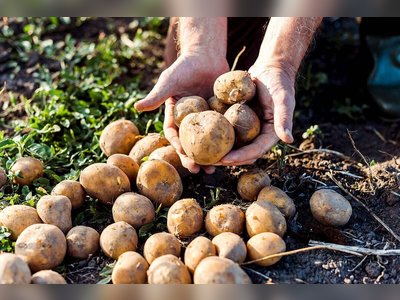Sixty-Year-Old Claims: “My Biological Age Is Twenty-One.” Want the Same? Remember the Name Spermidine
At the age of thirty-nine, Leslie Kenny was diagnosed with several severe autoimmune diseases: lupus, Hashimoto’s disease, and rheumatoid arthritis. Such a combination—where the body’s immune system attacks its own cells and tissues—at such a young age is considered rare. Doctors believed the inflammation in her body was uncontrollable and gave her only five years to live. She defied these dire predictions through immunotherapy treatments and lifestyle changes involving diet, exercise, and sleep, leading to complete remission of all her conditions. Today, at sixty, she claims that, according to tests she has taken, her biological age—however unbelievable it may sound—is twenty-one.
Kenny, co-founder of the Oxford Longevity Project, an organization working with Oxford scientists to make longevity research accessible to the public, was recently interviewed in a feature by the British Telegraph. She discussed her personal journey and, in particular, a compound regarded as the latest breakthrough in anti-aging science—spermidine. “There is no other compound so important in its ability to influence longevity,” she said, adding that it played a significant role in her recovery. Research supports her claims; unlike other longevity trends, spermidine has been tested both on laboratory mice and in human studies.
To understand spermidine’s benefits, one must first consider intermittent fasting—restricting eating to certain time windows each day or designating specific fasting days each week—which has gained popularity for weight loss and improving various health metrics. The method is favored within the longevity community for stimulating autophagy, the body’s natural process of breaking down and recycling malfunctioning or unnecessary cellular components, thereby improving cell efficiency.
However, many people cannot sustain intermittent fasting as a long-term lifestyle. Increasingly, research is turning the spotlight on spermidine—a natural dietary compound with a similar positive impact on autophagy. This molecule, found in many foods and in the human body, has become one of the most discussed topics in longevity research.
As Kenny explains, spermidine is present in a wide range of foods, especially plant-based or fermented products. Plants, animals, and microbes produce it naturally through metabolism, meaning any fresh or unprocessed food contains some level of the compound. What makes spermidine unique is its ability to trigger the body’s essential cell renewal and recycling processes—stimulating autophagy, which slows with age, leading to chronic diseases and cognitive decline. “It targets aging at its root,” Kenny says. “This manifests as reduced inflammation, increased hair growth, and many other benefits from cellular cleansing.”
A major international study published last year in Nature Cell Biology highlighted spermidine’s health benefits, identifying it as essential for longevity. “Think of it as a molecular amplifier for health,” the researchers concluded.
Kenny says she eats spermidine-rich foods daily, such as lentils, beans, and mushrooms. “I also take a minimal effective dose supplement of one milligram, which has been shown to improve memory in older adults with subjective cognitive decline,” she notes. She reports that spermidine dramatically reduced her inflammation markers to those of a healthy adolescent. “It even shows in my hair—I don’t dye it or need special treatments because it’s healthy and grows like it did when I was younger. My sleep has also improved significantly, with more hours of deep rest, allowing the brain’s glymphatic system—the ‘washing machine’ of the brain—to clear the waste accumulated during the day, reducing dementia risk.”
Kenny also highlights a gender-specific perspective. “Women bring a deeper understanding of emotional health, empathy, sharing, and holistic thinking,” she told Longevity magazine. “But there are still limitations that hold us back: underrepresentation in clinical trials, lack of funding, and gender bias in areas from pre-menopause and menopause to autoimmune diseases and fertility. Women are not just small men—we deserve research that reflects our unique biology. Inflammation, for example, affects women differently due to hormonal changes, and it’s important to know that. Reducing inflammation is not only about pain relief—it’s about preserving function, mood, and healthy longevity.”
She believes aging should not be viewed as a disease but as a process we can influence. “Longevity research typically takes about seventeen years to move from academia to the public. In our Oxford research initiative, we aim to bring it to people much faster, making Nobel Prize-winning concepts like autophagy part of daily practice. I’m living proof that the second half of life can be healthier, sharper, and more energetic. Aging is flexible, and with the right tools and mindset, you can write an entirely new chapter at any age.”
Cognitive decline is one of aging’s most feared consequences. A study published in Alzheimer & Dementia found that three months of increased spermidine intake improved memory in adults with moderate cognitive decline. Other studies have shown memory improvements and reduced inflammation markers in people aged sixty to ninety. Researchers say spermidine-induced autophagy breaks down defective proteins that can accumulate in the brain and lead to Alzheimer’s disease. This cellular maintenance enables neurons to function better. The positive effect is even greater when combined with the Mediterranean diet and its many health benefits.
Cardiovascular disease remains the world’s leading cause of death. Research by scientists from Shanghai and Shenyang universities in China, published in Nutrients, showed that spermidine supplementation improved cardiac elasticity and mitochondrial function—the cell’s respiration process that supports energy production. The study reported not only fewer heart attacks but also a significant reduction in all-cause mortality among those with high spermidine intake.
The gut plays a dual role: it is where spermidine from food is absorbed, and it is also where many beneficial gut microbes naturally produce it. According to researchers, spermidine supports gut health and helps maintain a balanced microbiome, which is important for preventing inflammation, metabolic disorders, and for overall health. While research is still in early stages, some studies suggest spermidine may help maintain an intact and strong intestinal lining, preventing toxins, bacteria, or partially digested food from entering the body and triggering inflammation. Evidence also indicates that spermidine helps immune cells in the gut function better, which is highly beneficial in slowing the aging process.
Studies indicate that a daily intake of five to ten milligrams can support health, though no ‘gold standard’ has yet been established and large-scale research is still needed for official medical recommendations.
Food Sources of Spermidine:
- Mushrooms: one hundred grams contain ten milligrams.
- Cheddar or other aged cheeses: one hundred grams contain ten milligrams.
- Wheat germ: one tablespoon provides about 1.2 milligrams.
- Additional recommended foods: soybeans, green peas, pears, lentils, broccoli, cauliflower, corn, red beans, and fermented foods like kimchi.
The general dietary advice emphasizes mostly plant-based, whole, seasonal foods, avoiding sugar, and using high-quality oils such as extra virgin olive oil, while avoiding alcohol due to its inflammatory potential.
Kenny’s Typical Diet:
- Morning: a cup of coffee enriched with MCT oil, collagen peptides, cocoa, and occasionally cinnamon. No breakfast.
- Lunch: soup with bone broth, garlic, onion, ginger, carrot, celery, broccoli, peas, and parsley, or shiitake mushroom soup with celery, onion, and carrot, sometimes adding egg or shrimp for protein.
- Dinner: butter-free risotto with plenty of vegetables, mainly peas, mushrooms, and pumpkin.
- Hot drinks: coffee and tea without milk or sweeteners.
- Snacks: fruit—mainly apples with nuts and sprouts. Occasionally tortillas or popcorn.
- Desserts: coffee or carrot cake, berries.
Supplements: multivitamins for women over fifty, B-complex vitamins, liposomal glutathione (an antioxidant), and a spermidine supplement before bed.











